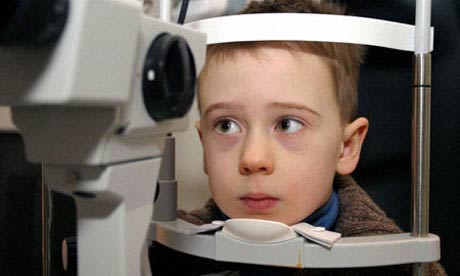 |
|
Drugs to be given to children at genetic risk of myopia may now be a real possibility.(guardian.co.uk) |
|
Scientists have discovered strands of genetic code linked to short sight, the most common eye disorder in the world. The findings shed light on what goes awry to make distant objects look blurred, and raises the prospect of developing drugs to prevent the condition. Understanding the biological glitches behind short-sightedness could help researchers develop eye drops or tablets that could be given to children to stop their vision from failing as they get older. Short-sightedness, or myopia, usually starts to manifest early on in life. The extent to which genes are to blame varies, but for those with the worst vision, around 80% of the condition is caused by genetic factors. Two separate studies, published in Nature Genetics journal, found variations in DNA that were more common in people with short sight. Chris Hammond, at King's College, London, found one section of DNA on chromosome 15 was more common in people with myopia. Caroline Klaver, at Erasmus Medical Centre in Rotterdam, found another strand, also on chromosome 15, linked to short sight. The variations in DNA amount to misspellings in the genetic code. These alter the activity of three genes that control the growth of the eyeball and ensure light entering the eye is converted into electrical pulses in the retina. The discovery helps scientists piece together how a healthy eye becomes short-sighted and points the way to medicines to prevent it in children. "My hope is that we can identify a pathway that we can block with eyedrops or tablets that will stop the eye growing too much and without interfering with normal brain development or other processes in the body," Hammond told the Guardian. (Read by Renee Haines. Renee Haines is a journalist at the China Daily Web site.) (Agencies) |
科学家最近发现了一组与近视有关的遗传密码。近视是目前世界上最常见的眼部疾患。 这项发现有助于阐明近视的成因,并为研发预防近视的药物带来了希望。 找到近视的生物起因可以帮助研究人员研制出防止儿童视力随年龄增长不断下滑的眼药水或药剂。 近视往往形成于青少年时期。 对不同的近视患者来说,基因的致病因素所占比例不同,但对于视力极差的群体而言,大约80%的病例都是基因导致的。 发表在《自然-遗传学》期刊上的两项独立研究都发现了更常见于近视患者的DNA改变。伦敦大学国王学院的克里斯•哈蒙德发现,15号染色体上的一个DNA片段更常见于近视患者。鹿特丹伊拉斯莫丹医学中心的卡罗琳•克拉弗发现,15号染色体上的另一段DNA与近视有关。 DNA变化相当于“拼错”了遗传密码,改变了三种基因的活动。这三种基因控制眼球生长、确保眼部所见光线在视网膜转化为电脉冲。 这项发现帮助科学家完整理解了健康的眼睛如何患上近视,并为研制儿童时期预防近视的药物指明了方向。 哈蒙德在接受《卫报》采访时说:“我希望我们可以找到预防近视的眼药水或药剂,防止眼部发育过快,同时不打乱正常的脑部发育或其它身体活动。” 相关阅读 (中国日报网英语点津 Julie 编辑冯明惠) |
|
Vocabulary: myopia: inability to see distant objects clearly because the images are focused in front of the retina; short-sightedness(近视) chromosome: 染色体 amount to: 相当于 retina: 视网膜 piece together: to make by or as if by joining pieces(拼合,凑集,组合资料以便了解情况) |